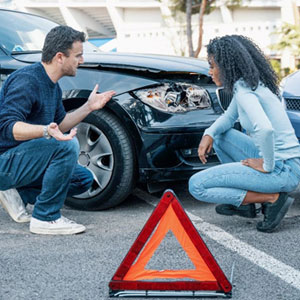
- Who is responsible for paying for car repairs after a car accident,
- How to file a property damage claim after a car accident, and
- Documentation needed to support a property damage claim.
Who Is Responsible For Paying For Car Repairs After A Car Accident?
The responsibility for fixing your car or vehicle after a car accident falls on the negligent party. However, there may be instances where the process is prolonged, and you may not receive immediate repairs. In such cases, you can refer to your own insurance policy to check if you have collision coverage that can expedite the repair process. This coverage allows you to avoid waiting for the negligent party’s insurance company to agree to pay your claim.
If you utilize your own insurance coverage, your insurance company may subrogate with the at-fault party’s insurance company to be reimbursed for the amount they pay you. Ultimately, the negligent party is responsible for all damages they caused, including property damage to your vehicle.
How Do I File A Property Damage Claim After A Car Accident?
When filing a property damage claim after a car accident, we contact the insurance company on your behalf and inform them about both the property damage and personal injury claims. The insurance company assigns two adjusters, one for handling the property damage claim and another for the bodily injury claim.
These claims are separate from each other. The property damage claim usually progresses more quickly, with the adjuster assessing the claim and arranging for the evaluation needed to repair the vehicle. This process typically takes less time than the bodily injury claim.
What Documentation Do I Need To Support My Property Damage Claim?
The documentation requirements vary depending on the insurance company. Some companies may require you to take your vehicle to a body shop they work with, where they can provide a direct estimate. Others may ask you to take pictures of your vehicle, which will be used by a trained adjuster to make an estimate of the damages.
Some companies may have their field adjuster evaluate the damages at your home, workplace, or tow yard. Alternatively, they may allow you to choose a body shop and provide an estimate from that shop. It’s not necessary to visit multiple shops; you can simply take it to one and share the estimate with the insurance company, which will work with the shop based on that estimate to arrange for repairs.
Can I Include Property Damage Repair Costs In My Personal Injury Claim?
Property damage and personal injury claims are separate from each other. The property damage claim can be settled independently, allowing you to get your car fixed, while the personal injury claim can proceed to court. Although they can settle together, they are completely independent claims. Once the property damage claim is settled and your vehicle is repaired, it has no bearing on your personal injury claim, as they are entirely separate.
Is There A Distinct Process For Filing A Property Damage Claim Compared To A Personal Injury Claim?
The main difference lies in the involvement of two separate adjusters—one for property damage and another for bodily injury. While some insurance companies may assign the same adjuster to handle both claims, there is still a separate process for each. Even if it’s the same adjuster, the settlements for property damage and bodily injury will be handled separately.
How Can I Determine The Extent Of Property Damage Costs Associated With The Accident And Repair Costs?
Once you receive the initial evaluation and take your vehicle to the body shop for repairs, the shop will further assess the damages as they begin working on your car. They will send a supplemental demand to the insurance company, seeking approval to cover all property damage related to the car accident.
For more information on Vehicular Damage In An Arkansas Auto-Accident, an initial consultation is your next best step. Get the information and legal answers you are seeking by calling (479) 750-2334 today.

Call Now To Learn More About Your Legal Rights
(479) 750-2334
(Calls Answered 24/7)
